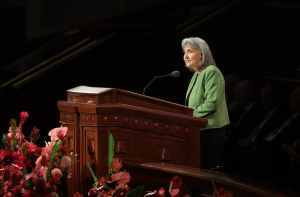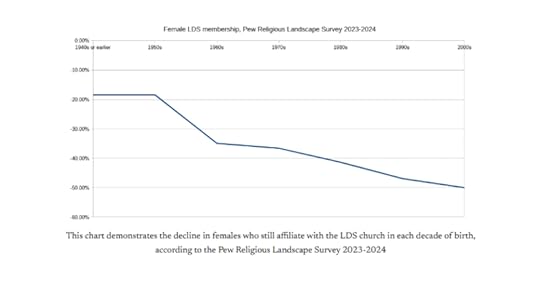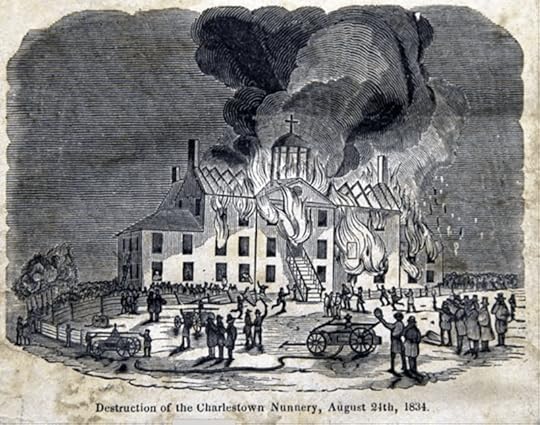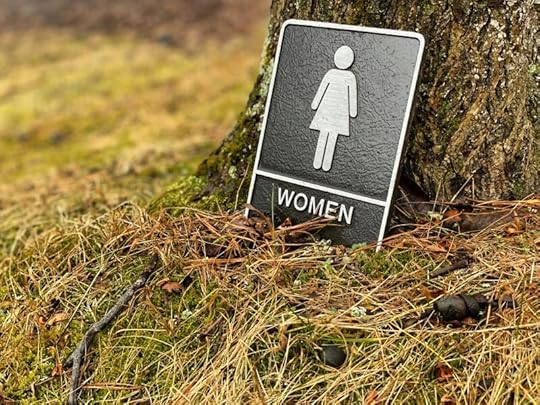Exponent II's Blog, page 5
October 13, 2025
Cinderella and the big bad(?) wolf

Did you know that before there was Disney’s Cinderella, before there were all the retellings and reimaginings, before Hans Christian Anderson’s supposedly sweet story, there was the Grimm brothers’ original version? In that version, each of Cinderella’s stepsisters cut off a piece of their own feet to fit in the ill-fitting glass slipper.
I’ve never had that much sympathy for the stepsisters–you’re not supposed to. But this version has a hint of victimhood for those women–that house was not a safe place for them, just as it was not for Cinderella.
I remember sitting in an Institute class where the topic of women who wanted careers, who didn’t want to be stay-at-home mothers, came up. I was sitting next to a man I liked. We were in the same grad program. I remember raising my hand to comment that I understood this because I used to be one of those women. But now–now I knew that the highest calling was for me to raise children who could have careers. That man and I had been partners and in the same group in multiple classes, and he knew I was competent, but I wanted to impress him–by putting myself into a box. By denying what I knew I wanted.
I remember once a man in my Utah singles ward got up in sacrament meeting and chastised women who were wearing shirts that would make a man passing the sacrament unworthy if he walked by her and looked down. I told him later that while I didn’t like it, he must have felt inspired to say it. I know he wasn’t inspired; he was a misogynist who felt it was his duty to “correct” women. I thought giving him the benefit of the doubt made me a bigger person. It didn’t. It made me shrink.
I’ve already shared how I didn’t consider myself a feminist when I was in college. I knew that was a bad word in Mormon circles–that men my age weren’t looking for a feminist wife.
I ran and hiked in high heat, wearing both garments and clothes that would cover them, making myself miserable, sometimes causing actual damage to my body. I lopped off the ability to show my shoulders or legs, to be comfortable in my own skin, to squeeze into Mormonism.
Early in my career, I had the opportunity to apply for a 9-month journalism fellowship in Germany. It included an essay on how this opportunity would benefit me. Even though I was already working and, you know, had a career, I was so sure what my future held was stay-at-home-motherhood that I made teaching my children the subject of that essay. I did not get the fellowship. I still cringe when I think of someone reading it.
Blogger Linda Hamilton shares the parts of herself she cut off, starting at age 19, to be a good Mormon woman.
How many Mormon women cut off pieces of themselves to fit into the supposed ideal of womanhood? They may do so seemingly of their own volition, but when they are told this is the only way to fit, the only way to get your eternal destiny–well, it’s understandable that their perspective gets a little myopic. Who knows how many women believe they are the only ones slicing off their heels and toes, their dreams of careers and writing books and traveling and getting a Ph.D. and finding the cure for cancer and running for office? When you look around and everyone else seems to fit easily into the given role, you believe you are alone. So you do the surgery yourself, grit your teeth and smile through the pain. The sacrifice will be worth it when you get your prince and your castle and your fairy tale ending.
What different choices would I have made–what different choices might you have made–if there were not a box for Mormon womanhood and we were not all told to fit ourselves into it regardless of personal cost? Or, how differently would we have made those decisions? It is a very good thing to choose motherhood. It is insidious when you are told motherhood is your future and you don’t need other dreams or anything else to make you happy.
In her book “Women Who Run with the Wolves,” Clarissa Pinkola Estès talks about what happens to a woman when she is forced to make herself small or contort herself to fit an unnatural shape: “A woman’s issues of soul cannot be treated by carving her into a more acceptable form as defined by an unconscious culture, nor can she be bent into a more intellectually acceptable shape by those who claim to be the sole bearers of consciousness. No, that is what has already caused millions of women who began as strong and natural powers to become outsiders in their own cultures. Instead, the goal must be the retrieval and succor of women’s beauteous and natural psychic forms” (4).
May we all who are outsiders in our culture reclaim our beautiful, strong, capable natures, hopes and goals and create a better culture for everyone who follows behind us.
Image: Photo by Josh Felise on Unsplash
October 12, 2025
A Conference Talk I Actually Liked

I don’t watch conference live these days. Something about the repetitive messages, the lack of female representation, and the prophetic worship just doesn’t do it for me. Not anymore.
Often times, I find conference to be more divisive than unifying. More uninspired than inspiring. More inauthentic than authentic.
The latter point may be the biggest stumbling block for me. Conference appears more like a spectacle; an opportunity for the church to shout “all is well in Zion” when the reality may be further from the truth.
Which is why I found Sister J. Anette Dennis’ talk to be so.. refreshing.
You may remember Sister Dennis from her controversial statement made at the general Relief Society meeting back in March of 2024.
“There is no other religious organization in the world, that I know of, that has so broadly given power and authority to women,” she boldly claimed.
She received an immense amount of pushback. The Instagram post that highlighted her statement has over 17,000 comments on it, many of which are critical of her words.
That is not an easy thing to face. Yet Sister Dennis did so with grace and respect. She acknowledged the comments, expressed gratitude for their willingness to share, and assured them that their concerns were heard.
When has a general authority ever done something like this? When their words are steeped in controversy and have hurt various members and non members, when have they ever acknowledged the pain? When have they ever offered assurance that they were listening to their followers?
Correct me if I’m wrong, but the typical response by general authorities is silence.
Sister Dennis broke that mold.
I gained so much respect for her that day.
Disappointedly, we haven’t seen any changes since that exchange. But I don’t blame Sister Dennis for this. She isn’t the one with the authority to create meaningful and lasting changes within the church.
But she can make a difference, albeit a small one, when she is given the opportunity to step up to the pulpit at general conference.
And that is exactly what she did.
What proceeded was one of the most authentic and vulnerable conference talks that I have ever heard.
Sister Dennis experienced what sounds an awful lot like a faith crisis.
She says, “When I was in my late 20s, I went through a period of deep depression, and during that time, it was as if the reality that God existed was suddenly gone. I can’t fully explain the feeling other than to say I felt completely lost. From the time I was a young child, I had always known that my Father in Heaven was there and that I could talk to Him. But during that time, I no longer knew if there was a God. I’d never experienced anything like that before in my life, and it felt like my whole foundation was crumbling.”
As someone who, in their late 20s, experienced the same thing, I can attest to the feelings she describes above. How refreshing it is to hear such rawness, such vulnerability, on the most public stage that the church has to offer.
There is no indication of shame in her voice. No “pull yourself up by the bootstraps” sort of language. No insistence that something is wrong with you, or that you’re not doing enough or being enough.
Only a simple acknowledgement that this happens sometimes. Perhaps it’s even something out of our control. And what we need from church, isn’t often what we get.
She continues, “As a result, it was hard for me to attend church. I went, but it was partly because I was afraid of being labeled “inactive” or “less faithful,” and I was afraid of becoming someone’s assigned project. What I really needed during that time was to feel genuine love, understanding, and support from those around me, not judgment.”
In other words, we don’t need to be told that something is wrong with us. We don’t need labels that oversimplify our very complex experiences and feelings. And we certainly don’t need to be seen as a project in need of being fixed.
As Valerie Hamaker taught me through her Latter-day Struggles podcast, there is nothing wrong with us. We are simply growing. Expanding. Evolving.
We may feel broken, but the rebuilding is where the magic happens.
Sister Dennis then asks, “Are there those among us who suffer in silence, afraid for others to know their hidden struggles because they don’t know what the reaction will be?”
The answer to this is a resounding YES.
Because of this, we have a serious lack of authenticity within the church. The reactions, the stigma, the consequences, and the shame can be too much for a person to bear.
So we pretend. We force ourselves to go to church while plastering fake smiles upon our faces.
We don’t feel safe enough to be real.
Which is why, as Sister Dennis emphasizes, we should abstain from judgement. Because we never know the experiences, the trauma, and the burdens that others are facing.
We have to create an environment where we can wear our trauma upon our sleeves, without the fear of rejection.
Sister Dennis admits that she herself used to poorly judge those who stepped away from church. I’d be lying if I said I never did.
Yet these crises of faith cause something to change within us.
Sister Dennis’ compassion and love for those doubting and on the margins didn’t come in spite of her faith crisis; those Christ like qualities came because of her faith crisis.
And so did her authenticity.
I can’t recall a time that I have felt more seen by a general conference talk. Rather than dragging down those who doubt with harsh and ignorant rhetoric, Sister Dennis spoke with true wisdom and understanding that can only come from a person who has experienced a faith crisis themselves.
Dare I say, she spoke as a true prophetess.
More authenticity shined through the talk given by Elder Peter M. Johnson, who vulnerably shared the pain and anger he felt when he first learned of the priesthood and temple ban of Latter-day Saints with African descent.
It is no coincidence that his talk focused on ministering to the one, while Sister Dennis similarly emphasized the need to cheer one another on, regardless of where we may find ourselves on our own individual journeys.
Through them, I heard unity, inspiration, and authenticity.
And I realized just how famished I had been for such things.
While I don’t agree with them on everything, their overall messages were inspired by their own complex, pain riddled, imperfect experiences.
We need more leaders who have had these experiences. We need more people who are willing to be vulnerable and authentic; people who will say the quiet part out loud. People who don’t wear fake smiles and force fake voices and perform a spectacle.
We need people who are real.
Which means we need to create a culture where reality and vulnerability can flourish.
Talks like these will hopefully normalize doubt, pain, and uncertainty as it can be experienced within an LDS context.
Will more members be brave enough to grasp the opportunity to truly be themselves, warts and all?
I certainly hope they do.
And when they do, I hope they are met with the genuine love, understanding, and support that Sister Dennis spoke of.
So, to my surprise, I actually liked a talk or two this year.
If there is anything else I learned from these speakers, it would be this: They are proof that women and minorities ought to be given the microphone much, much more.
October 11, 2025
Listening: an Invitation – Letter From the Editor by Millie Tullis

This Letter from the Editor introduces the Fall 2025 issue of Exponent II.
Dear reader,
I am thrilled to picture you holding this issue of Exponent II in your hands. As the new editor in chief, this issue has taught me so much — about listening and about community. I am grateful to the community that built this magazine over 50 years ago, the community of writers that contributed their voices to this issue, and the community of volunteers and editors who continually put it all together.
My managing editor, Natasha Rogers, and I are especially grateful to Rachel Rueckert and Carol Ann Litster Young, the former editor in chief and managing editor. We are grateful for the love and labor they poured into Exponent II over these past four years. We are grateful for their kind support throughout this editorial transition. Carol Ann and Rachel are generous listeners, leaders, and friends. We’re honored to continue the work.
In this fall issue, we asked our writers and community to tell us about listening. As I write this letter in September of 2025, I am struck by how crucial listening is, how desperately we need generous listeners and bold truth-tellers, right now, in all of our communities. There is so much work to do, and this issue is one step towards deeper listening. In this issue, you will find many perspectives, stories, and accounts of listening — from moments of meaningful connection to advice on growing as a listener to examples of the damage poor listening can do.
These voices take on many forms — poems, essays, clay, paint, a sacrament meeting talk, stained glass, portraits, interviews, and letters. In Sarah King’s “Open Letter,” a young feminist addresses Prophet Russell M. Nelson directly and requests that he hear her. Many writers find a deeper spirituality and connection through listening — to classical music, to the divine, to our bodies, to our intuition, to ourselves.
Several pieces take on listening as a skill; a skill that we can nurture and grow, and a skill that we must use to connect across difficulties and differences. Nicole Sbitani advocates for listening that is radical and reciprocal. Leticia Storrs shows how Mormonism’s roots teach us to celebrate difference. Becca Kearl, a professional in creating connection through conversation, offers practical advice on forming our ability to listen deeply, especially when we disagree.
Inability to communicate about the powerful dangers in our culture — racism, abuse, and misogyny — is closely examined in these pages. Ragan Fry’s short story centers on a toxic marriage and the lingering effects of hearing loss. Elaine Turner describes the experience of recognizing her own racial privilege as the white mother of Black sons. Lori LeVar Pierce’s “The Ward Librarian” and Ruth Ann Snow’s “Women Hearken, Men Listen — Sometimes” reveal the painful limitations for mutual understanding between all genders in a deeply patriarchal Church. Brooke Palmer’s poem, “The Silencing of Ophelia,” hauntingly concludes: “Being silenced hurts more // Than drowning.”
As with every issue of Exponent II, this collection of voices are doing the work of feminism in and out of Mormon communities, homes, gardens, and church buildings. The magazine you hold in your hands is a testimony to the power that is generated when we exercise our voices to bridge understanding, to reach others, and see ourselves.
Grateful, and listening,
Millie
Subscribe to the magazine by October 15th to receive the Fall 2025 “Listen” issue in your mailbox starting in December.
And consider submitting to the Winter 2026 “Aging” issue.
(Photo by Mateo Media on Unsplash)
The Struggle for Integrity: Examining LDS Corporate Values

Members who give so much spare time and money to the LDS Church deserve transparency and accountability regarding LDS institutional goals, policies and practices. They deserve to know whether the Church operates chiefly as an ethical organization or as one driven by corruption and self-interest. Those exploring or belonging to the LDS Church deserve clarity on whether its central mission is to embody Christlike values or to pursue corporate power and material gain.
LDS Corporation Behavior
The following are some considerations for anyone evaluating the LDS Church’s corporate behavior:
Corporations seek to make money, and the LDS Church is doing that very successfully. It is currently valued about $300 billion and could be a trillion-dollar church by 2044. To become the wealthiest church on the planet, it requires its members to pay ten percent of their gross income to the church, It also encourages its members to donate generously through fast offerings to help poor members or through humanitarian donations to help suffering folks throughout the world.
To increase its revenues, the Church has systematically eliminated all custodial positions for its meetinghouses, requiring members to clean them weekly and to clean temples and other church properties after business hours. For members to become forever families, members must pay a full tithing and are told to do so even if their children are hungry or unhoused.
To further increase its profits, the Church has divested itself of its hospitals in the United States and schools outside of the United States, including schools in Mexico and New Zealand. Although its top leaders are paid a generous stipend, its 35,000 local leaders volunteer their time and often contribute financially to help their congregations, since little tithing money is returned to congregations.
2. The LDS Church has failed to uphold ethical corporate standards, including adherence to government regulations, honesty, transparency, and accountability. Because LDS Church has failed in this regard, it was fined by the SEC for creating shell companies to hide church assets. These shell companies were created at the request and with the knowledge of top LDS leaders, who were specifically fined for this.

Australia has investigated the LDS Church for creating a shell company to hide its assets. In addition, Canadian officials have observed that LDS leaders have moved $1 billion out of Canada to fund Brigham Young University to Canada, leveraging a Canadian tax provision that allows donations to foreign institutions with certain criteria, like having Canadian students, to be tax-deductible–although few Canadian students attend that school.
The best practices for churches require them to release annual financial reports, but the LDS Church refuses to do so. Accounting scholars who have reviewed LDS financial governmental reports have observed that two-thirds of Church tithing income is placed in investment accounts, and little, if any, tithes are used for humanitarian work. The Church inflates its humanitarian reports with fast offering monies, which are used mostly for members and, hence, are not humanitarian, since humanitarian spending must be given with no regard to one’s religious affiliation.
3. Successful corporations satisfy their stakeholders, but it is difficult to know how satisfied LDS members are. The LDS Church reports having a membership of over seventeen million, but statisticians suspect the real number is about 35% of that amount, about 6 million. Because missionaries quickly convert and baptize new members without fully integrating them into the church culture, the retention rate is projected to be about 25% outside of the United States.. One statistician states that “at least 145,912 records were removed in 2024—due to death, resignation, or loss of membership (formerly known as excommunication),” the highest number ever. Most alarming, Pew Research Center shows a dramatic loss of female LDS members born after 1960.

LDS Church Corporate Culture and Values
The LDS Church identifies a four-fold mission. We will evaluate the Church’s behavior concerning these four objectives.
Live the gospel of Jesus Christ. The LDS Church defines the gospel as faith in Jesus Christ, receiving the Holy Ghost, repentance, and enduring to the end. Although the Church expects members to abide by these principles, it often does not. It refuses to apologize for past mistakes, including denying temple blessings for Black members until 1978, massacre of indigenous peoples, a past policy of denying blessings and baptism to children of LGBTQ members, and a host of other discriminatory or violent practices.
Invite all to receive the gospel. In 2024, the Church reported that it had 74,000 full-time missionaries and 31,000 missionaries worldwide, so it is working hard to fulfill that goal. However, China recently closed down all LDS congregations, and the LDS church is struggling in India and has no missions in 29 Muslim countries. Although it is doing well in some African regions, other Christian missionaries have been building congregations, hospitals, schools, and medical clinics in these areas for many years before the LDS Church decided to proselytize there.
Unite families for eternity.The LDS Church places strong emphasis on temple sealings for both the living and the dead—some deceased individuals have reportedly had their ordinances repeated dozens of times. Yet only those who follow the Church’s strict requirements—tithing, abstaining from alcohol, coffee, and tea, wearing temple garments day and night, and other commandments—are allowed to enter a temple and be sealed to their families. According to LDS theology, failing to “endure to the end” can mean losing one’s eternal family. In reality, the number of active LDS families sealed in temples is minuscule compared to the total number of people who have ever lived.
Care for those in need. Although some congregations of the LDS Church are very helpful in ministering to those in need, in much of the developing world, ward members lack the resources to feed malnourished members. In Salt Lake City, the headquarters of the LDS Church, other churches and charitable organizations run food banks, open their doors to the homeless during the winter, and run refugee programs. Although LDS Church members give fast offerings to help those in need in their congregations, in the developing world their donations cannot begin to feed the many people who are starving, including malnourished children.

Photo of the City Creek Mall in Salt Lake City
In 2012, the LDS Church spent over $1.5 billion to build the luxurious City Creek Mall in Salt Lake City and has spent hundreds of billions of dollars purchasing high-end real estate and farm land throughout the world. It is one of the top five landowners in the United States. Yet, the amount that the LDS Church spends on humanitarian work is less than 1% of its tithing income.
Because of its vast financial holdings, the LDS Church is the twentieth richest corporation in the world, and it is becoming the richest church in the world as well. It devotes considerable effort to presenting a positive public image has has at times excommunicated those who openly criticize its practices. The Church’s Strengthening the Members Committee monitors media and member activity to identify individuals who may face discipline or removal.
Moving to Christlike Behavior
To move from a corrupt corporation to a Christlike church, the LDS Church needs to make the following changes:
Decide to follow the laws of the land regarding its financial transactions, reporting, and disclosures. The LDS Church should follow the standards of honesty that it expects its members to follow. It says, “If we are dishonest in our words or actions, we hurt ourselves and often hurt others as well. If we lie, steal, [or]cheat,… we lose our self-respect. We lose the guidance of the Holy Ghost.We may find that…people no longer trust us.”
Give one-tenth of its tithing income for humanitarian work. The Church currently has enough money to sustain itself for over 30 years or more; one-tenth of the Church’s income is about $3 billion.
Ensure that all malnourished children in the Church and its locations receive food supplements to prevent child wasting. The Church has the knowledge, means, and people to do this.
Release honest financial reports that show how Church donations are received and spent. If the Church has nothing to hide, it should hide nothing.
Apologize for past financial lies, historical misinformation, genocide and racism. Any institution that does not acknowledge and atone for past mistakes may repeat them.
Use the vast missionary force to collaborate with local community leaders to become a worldwide humanitarian force. This practice will teach missionaries the importance of Christlike service and will attract members to a Church that places people’s needs over the aggrandizement of wealth.
Place the value of protecting children over protecting the image of the Church. Implement stronger safeguards for the vulnerable by requiring background checks and ending private “worthiness” interviews. Avoid teaching that all leaders are divinely chosen, as some have been abusers. Provide better training and oversight for ecclesiastical leaders. Instruct bishops to report all allegations of child abuse to civil authorities, and establish a hotline staffed by trauma-informed specialists empowered to identify and address abuse within the Church.
Move from fear-based policies, practices, and curricula to love-based ones. Ensure that all family members can attend their loved one’s weddings. Include in all curricula instruction on recognizing and preventing domestic violence, child abuse, and racism.
Teach principles of Christlike love, patience, mercy, kindness, and empathy in Church lessons. For decades in Utah–which until recently was predominantly LDS–the rates of sexual abuse, rape, and domestic violence has been high. The LDS Church can and must do better to fulfill its stated goal of becoming a Zion people, of one heart and one mind, with no poor among them.
Require greater accountability of top leaders to members by the law of common consent. Give emeritus status to all leaders older than seventy and create a system where an equal number of women participate in all decision-making processes in the Church.
A recent survey indicates that post-Mormons are higher than active Mormons in virtues of kindness, nurturance, reciprocal altruism, and fairness, and lower than active Mormons in deference to authority, obedience to a purity culture, and ingroup loyalty. Since the LDS Church focuses more on temple worthiness and deference to its leaders and less on showing compassion for the marginalized, those studies may reflect a need for the Church to show greater compassion to those who suffer.
Conclusion
As the leaders of the Church prepare for the Second Coming of the Savior, it will be interesting to see how much of their vast stockpile they will use to reduce suffering and how much of it they will save to present to Jesus.
To follow Jesus, the Church will need to move from a corrupt corporate model to a compassionate church model. This will require a change of its major policies and practices. Inclusion of more women, minority groups, and people outside the United States in all levels of Church governance will help the LDS Church better reflect and understand the people whom it is commissioned to serve. At the Sunday afternoon session of General Conference, President Oaks revealed how much power the top LDS leader has to make decisions regarding the Church as he quickly ended the overbuildings of temples. Hopefully, he will have the wisdom and courage to end other harmful practices that hurt people and ignore suffering.
To become a Christ-centered Church, it needs to move from its patriarchal model of governance to a complementarian model. In a Church that is created by upper-class heterosexual white American men to protect and serve men like them, this will require compassion, equity, and integrity.
Brene Brown says it best: “When the culture of an organization mandates that it is more important to protect the reputation of a system and those in power than it is to protect the basic human dignity of individuals or communities, you can be certain that shame is systemic, money drives ethics, and accountability is dead.”
Thanks to Keith Rapier on Unsplash for the photo of City Creek Mall
Thanks to Farragutful on WikiMedia Commons for the 2019 photo of the Salt Lake Temple
Come Follow Me: Doctrine and Covenants 111–114 “I Will Order All Things for Your Good”

Doctrine and Covenants 111 can be a tricky section to teach. Joseph Smith and other church leaders traveled to Salem, Massachusetts, to pursue an ill-advised treasure hunt. They hoped to resolve the financial problems of the recently established Church of Jesus Christ of Latter-day Saints (LDS) with a get-rich-quick scheme, and the revelation documented in Doctrine and Covenants 111 seemed to reassure them that they actually could find hidden treasure there. (Spoiler: They did not find anything of monetary value in Salem.)
What they did find was a city rich with history. While they were in Salem, they visited historical sites, where they learned about the Salem Witch Trials and other tragedies stemming from religious zealotry and intolerance, gleaning valuable insights they could apply to their own church.
Let’s follow in their footsteps and discuss what modern church members can learn from the Salem Witch Trials. How can we avoid becoming the next generation’s cautionary tale of religion gone wrong?
In this Lesson PlanA Get-Rich-Quick SchemeA Pivot from Treasure-Hunting to Historical ResearchLessons Learned from the Salem Witch TrialsLessons Learned from the Ruins of the Urseline Convent Revisiting Doctrine and Covenants 111 with the Benefit of HindsightA Get-Rich-Quick SchemeIn 1836, the very young and new Church of Jesus Christ of Latter-day Saints (LDS) was in financial trouble.
At that time, heavy debt weighed upon the leaders of the Church due to loans secured to purchase land, to acquire goods for the mercantile establishments of the Church, and to build the Kirtland Temple. In addition, in 1833, when mobs expelled the Saints from Jackson County, Missouri, they also took control of the Church-owned printing press and goods from the Church-owned store. Earlier, leaders in Ohio and in Missouri formed a joint business to manage the Church’s assets. This joint business was given the name of the United Firm. Joseph counted on both of the Missouri enterprises—the printing press and the store—to raise funds to help repay creditors in New York City. With the loss of the income-producing printing press and store commodities, the Church was unable to pay for the goods that members of the United Firm had purchased on credit.
—Craig James Ostler, BYU Religious Studies Center, Treasures, Witches, and Ancient Inhabitants (D&C 111), You Shall Have My Word: Exploring the Text of the Doctrine and Covenants
While church leaders were grappling with these financial problems, someone presented a solution that sounded almost too good to be true. There was hidden treasure in an abandoned home in Salem, Massachusetts. All they had to do was search the house, and their problems would be solved!
When have you heard of solutions that sound too good to be true in our modern world? How have these solutions actually worked out?
Ebenezer Robinson asserted that in the summer of 1836, “a brother in the Church, by the name of Burgess, had come to Kirtland and stated that a large amount of money had been secreted in the cellar of a certain house in Salem, Massachusetts, which had belonged to a widow, and he thought he was the only person now living, who had knowledge of it, or to the location of the house.”
—Craig James Ostler, BYU Religious Studies Center, Treasures, Witches, and Ancient Inhabitants (D&C 111), You Shall Have My Word: Exploring the Text of the Doctrine and Covenants
Four church leaders, Joseph Smith, Sidney Rigdon, Hyrum Smith, and Oliver Cowdery, traveled to Salem to find the hidden treasure. But as is often the case with get-rich-quick schemes, attempting to carry out the plan proved to be more complicated than they had expected.
According to Robinson, after arriving, “Brother Burgess met them in Salem, evidently according to appointment, but time had wrought such a change that he could not for a certainty point out the house, and soon left. They however, found a house which they felt was the right one, and hired it.” Apparently, Robinson had some misinformation. On August 19, 1836, Joseph wrote from Salem to his wife Emma in Kirtland, Ohio, “We have found the house since Bro. Burgess left us, very luckily and providentially, as we had one spell been most discouraged. The house is occupied, and it will require much care and patience to rent or buy it.”
—Craig James Ostler, BYU Religious Studies Center, Treasures, Witches, and Ancient Inhabitants (D&C 111), You Shall Have My Word: Exploring the Text of the Doctrine and Covenants
While the four LDS leaders were staying in Salem, trying to figure out how to access the house that supposedly held the treasure, Joseph Smith recorded the revelation found in Doctrine and Covenants 111. It began:
What “follies” do you think this verse is referring to?If this journey was a “folly,” why wasn’t the Lord “displeased”?When have you felt God’s love “notwithstanding your follies”?
I, the Lord your God, am not displeased with your coming this journey, notwithstanding your follies.
—Doctrine and Covenants 111:1
Despite that comment about “follies,” the rest of the revelation seemed promising.
2 I have much treasure in this city for you, for the benefit of Zion, and many people in this city, whom I will gather out in due time for the benefit of Zion, through your instrumentality.
7 …Tarry in this place, and in the regions round about;
8 And the place where it is my will that you should tarry, for the main, shall be signalized unto you by the peace and power of my Spirit, that shall flow unto you.
9 This place you may obtain by hire. And inquire diligently concerning the more ancient inhabitants and founders of this city;
10 For there are more treasures than one for you in this city.
11 Therefore, be ye as wise as serpents and yet without sin; and I will order all things for your good, as fast as ye are able to receive them. Amen.
Doctrine and Covenants 111:2, 7-11
Doctrine and Covenants 111 instructed these church leaders to “tarry” in Salem and learn about its “ancient inhabitants and founders,” so they did.
A Pivot from Treasure-Hunting to Historical Research
Joseph and his three companions followed the direction in the revelation to “tarry in this place” and spent several weeks in Salem, preaching and visiting historic places while hoping to obtain money to help pay Church debts and redeem Zion. But no documents exist indicating that they saw this revelation fulfilled in any way by the time they returned to Kirtland.
—Elizabeth Kuehn, More Treasures Than One, Revelations in Context
Think of a historical site you’ve visited. How did learning about history impact you? Ask the class if anyone is willing to share an experience visiting a historical site.Lessons Learned from the Salem Witch Trials
During the approximately three weeks that they remained in the Salem area, in obedience to the Lord’s command, Joseph and his companions learned much regarding the early history of New England. For example, they visited the East India Marine Society Museum in Salem. The guest register for the museum exhibits the names of Oliver Cowdery, Sidney Ridgon, and Joseph Smith. Cowdery and Rigdon visited the museum on August 6, 1836, and Joseph on August 9, 1836. Both visits were within one week of receiving the Lord’s instructions to inquire after the ancient inhabitants of Salem.
…Based on his descriptions, it becomes clear that Oliver considered the “ancient inhabitants” mentioned in the revelation to refer to the early Puritan settlers in Salem. Furthermore, the time that Oliver dedicated to researching the ancient inhabitants and his lengthy letter documenting his research manifest that he gave great importance to his findings.
…Cowdery further wrote of nearby locations that he visited. From his references to other areas and events, it appears that he, and possibly Joseph, Hyrum, and Sidney, visited Lexington, the Bunker Hill monument (then being erected), the State House in Boston, the navy yard in Charleston, and Cambridge, Massachusetts.
—Craig James Ostler, BYU Religious Studies Center, Treasures, Witches, and Ancient Inhabitants (D&C 111), You Shall Have My Word: Exploring the Text of the Doctrine and Covenants
Oliver Cowdery wrote to the LDS church newspaper, the Latter-day Saints’ Messenger and Advocate, detailing what he had learned about the Salem Witch Trials, sarcastically referring to the Puritan witch hunters as “very righteous.”
 Colorized image of the Salem witch trials in 1692-1693
Colorized image of the Salem witch trials in 1692-1693What do you think Oliver meant when he said he wanted members of the church to understand the “matter of the fact,” not just the facts?
During my tarry in this country, I have visited Salem, 15 miles from this city [Boston]. I viewed the hill, immediately to the north-west of the town, on which they used, in olden times when they were very righteous, to hang people for the alleged crime of witchcraft—it still bears the name of “witch hill,” and looks down upon this ancient town like a monument set up to remind after generations of the folly of their fathers. This witch business began in 1691, and was so effectually carried on for about two years that the innocent blood of hundreds moistened the earth to gratify the vile ambition of jealous mortals. It may not be wholly uninteresting to the readers of the Messenger, to give a short account of this disgraceful affair, as found in some of the ancient writings on that subject. I am aware that the fact is familiar with us all, but the matter of fact is not.
—Oliver Cowdery, Prospectus, Latter-day Saints’ Messenger and Advocate, October 1836
The “short account” Oliver sent to early Latter-day Saints to read was actually a very long, multi-page excerpt from an exposé about the Salem Witch Trials written by Robert Calef in 1697. In Sunday School class, we will not have time to read such a lengthy history, but I agree with Oliver Cowdery that it is valuable and relevant for members of our church to learn about the Salem Witch Trials, so I recommend watching the video, What really happened during the Salem Witch Trials by Brian A. Pavlac, TED-Ed.
Why do you think Oliver Cowdery wanted to teach early members of the church about the Salem witch trials?What lessons should modern members of the church learn from the Salem witch trials?Consider these insights from Randi Fuller, a modern Latter-day Saint woman who visited Salem to learn more of the story of her ancestor Susannah Martin, one of the women executed for witchcraft during the Salem Witch Trials.
Lessons Learned from the Ruins of the Urseline Convent
My first visit to the town left an indelible mark. Walking the streets she once walked, looking out over the harbor, and standing before her memorial stone brought her story to life. Susannah faced three accusations of witchcraft from neighbors and community leaders seeking to serve their own agendas. These claims — rooted in personal grievances and disdain for her outspoken nature — forced her to endure grueling interrogations. The court sought confessions through humiliation and coercion, but she never yielded. Her defiance was clear in her bold assertion: “Let them think what they will.”
Though society no longer hangs witches, it continues to judge and ostracize modern-day apostates and heretics. The mechanisms have changed, but the behavior remains the same. Those who challenge cultural, political, religious norms are labeled as outcasts, subjected to gossip and various forms of shunning, including exclusion. These modern witches face metaphorical death blows through shaming and isolation.
These mechanisms of social death seen in Salem eerily echo some systems, policies, and cultural norms within the LDS Church. Puritan authorities wielded the belief in witchcraft as a tool to maintain control and order, targeting socially marginalized individuals — especially women such as widows, healers, or those with unconventional behaviors — who were particularly vulnerable to suspicion. Similarly, marginalized LDS members engaging in socially high-risk practices, like questioning, dissenting, reading non-approved literature, or leaving the faith, often face the label of “apostate.” These individuals frequently endure shunning, gossip, and sometimes institutional censure.
…I’ve felt the echoes of Salem’s madness in my own life. At 25, I married in the temple, fulfilling the picture-perfect ideal of a faithful Latter-day Saint married woman. But when my husband left me and the Church, my status within the community shifted. Conversations with other members grew awkward, friends distanced themselves, and I felt branded with a scarlet letter.
—Randi Fuller, The Salem Witch Trials and Social Death: A Lesson Still Unlearned, Exponent II Magazine, 2025
Joseph Smith, Sidney Rigdon, Hyrum Smith, and Oliver Cowdery also visited the site of a more recent tragedy, the ruins of a Catholic convent and boarding school for girls in Charlestown, Massachusetts that had been burned down by an anti-immigrant and anti-Catholic mob two years earlier.
 Burning of the Urseline Convent and School in Charlestown, Massachusettes, 1834
Burning of the Urseline Convent and School in Charlestown, Massachusettes, 1834Oliver Cowdery also shared what he learned at the site of the destroyed convent and Catholic school in the LDS church newspaper:
How would you answer Oliver Cowdery’s question, “Is this religion?”
It was a religious persecution—a disgraceful, shameful religious persecution—one, or more, religious societies rising up against another. Is this religion? The good people here, being very tenacious of right, as well as the tradition of their ancestors, thought it doing God service to burn a Catholic convent, because the Catholic religion was different from their own. The Author of my existence knows the sorrowing of my heart, on the reflection that our country has come to this, that the weak must be trodden down by the strong, and disorder, confusion and terror, must distract our land and sow the discordant seeds of party strife and party animosity in the hearts of ignorant men, led on by infatuated priests, to overwhelm the continent with blood, and spread destruction and devastation throughout our happy asylum, and expose us to the fire, the sword, the rack and to death!
—Oliver Cowdery, Prospectus, Latter-day Saints’ Messenger and Advocate, October 1836
Joseph Smith also wrote down his impressions from the historical sites they visited in Massachusetts.
How do people become “lost to principles of justice and religious liberty”? How can we avoid this tendency?
The early settlers of Boston (the Emporium of New England) who had fled from their mother country to avoid persecution and death, soon became so lost to principles of justice and religious liberty as to whip and hang the Baptist and the Quaker, who like themselves, had fled from tyranny to a land of freedom; and the fathers of Salem from 1692 to 1693, whipped, imprisoned, tortured, and hung many of their citizens for supposed witchcraft; and quite recently, —while boasting of her light and knowledge, of her laws and religion, as surpassed by none on earth, —has New England been guilty of burning a Catholic convent in the vicinity of Charleston, and of scattering the inmates to the four winds; yes, in sight of the very spot where the fire of American independence was first kindled, where a monument is now erecting in memory of the battle of Bunker Hill, and the fate of the immortal Warren, who bled, who died, on those sacred heights, to purchase religious liberty for his country¬—inside of this very spot, have the religionists of the 19th century, demolished a noble brick edifice, hurling its inhabitants forth upon a cold and feeling world for protection and subsistence.
Well did the Savior say concerning such, “by their fruits you shall know them.” And if the wicked mob who destroyed the Charleston convent, and the cool, calculating religious lookers on, who inspired their hearts with deeds of infamy, do not arise, and redress the wrong, and restore the injured four-fold, they in turn, will receive of the measure they have meted out till the just indignation of a righteous God is satisfied. When will man cease to war with man, and wrest from him his sacred rights of worshiping his God according as his conscience dictates? Holy Father, hasten the day.
—Joseph Smith, as quoted in History of the Church of Jesus Christ of Latter-day Saints Period I: History of Joseph Smith, the Prophet, by Himself: Volume II, edited by Brigham Henry Roberts, 1902
Notice that Joseph Smith called on both “the wicked mob who destroyed the Charleston convent, and the cool, calculating religious lookers on” to “redress the wrong.”
What were the onlookers guilty of?Why must onlookers redress wrongs alongside perpetrators?How can we redress wrongs in our modern society, even if we weren’t the perpetrators?Revisiting Doctrine and Covenants 111 with the Benefit of HindsightFive years after Joseph Smith, Sidney Rigdon, Hyrum Smith, and Oliver Cowdery’s unsuccessful attempt to find hidden treasure in Salem, Massachusetts, the First Presidency of the LDS Church sent a missionary, Erastus Snow, a copy of the revelation now contained in Doctrine and Covenants 111 and told him to go to Salem and give it another try. Erastus Snow didn’t find any money in Salem either, but he did establish a branch of the LDS Church in Salem. (See Elizabeth Kuehn, More Treasures Than One, Revelations in Context.)
Now with the benefit of hindsight, knowing that no treasure was ever found in Salem to save the Church financially, invite the class to silently reread Doctrine and Covenants 111:2, 7-11, while thinking about the following questions:
What do you think about the revelation’s assertions about “treasure in this city”? Could it have been wishful thinking? A conditional blessing that wasn’t granted? A more intangible treasure?Doctrine and Covenants 111 will not help us find any money, but what else can we learn from these verses?
2 I have much treasure in this city for you, for the benefit of Zion, and many people in this city, whom I will gather out in due time for the benefit of Zion, through your instrumentality.
7 …Tarry in this place, and in the regions round about;
8 And the place where it is my will that you should tarry, for the main, shall be signalized unto you by the peace and power of my Spirit, that shall flow unto you.
9 This place you may obtain by hire. And inquire diligently concerning the more ancient inhabitants and founders of this city;
10 For there are more treasures than one for you in this city.
11 Therefore, be ye as wise as serpents and yet without sin; and I will order all things for your good, as fast as ye are able to receive them. Amen.
Doctrine and Covenants 111:2, 7-11
After the class has had a chance to reconsider Doctrine and Covenants 111:2, 7-11, discuss how the a different interpretation of the text might impact our lives.
How has the Lord helped you find unexpected “treasures”?What has He done to “order all things for your good”?What does the phrase “as fast as ye are able to receive them” teach you about Heavenly Father?Why are “lessons of justice, equality, fairness, tolerance, and inclusion,” important for members of the LDS Church?How do we distinguish “between intolerance for wickedness and tolerance for differing religious beliefs”?How can we recognize when our modern faith community is “excessively crusading against real and supposed evils among us”?
The journey to Salem, Massachusetts, brought forth fruits much more valuable than treasure hunting. On one hand, it is difficult to determine with absolute certainty this journey’s influence on the Prophet Joseph Smith and the other three leaders of the Church. On the other hand, it appears to be clear that they had many opportunities to learn about the need for the Latter-day Saints to welcome into their communities individuals of good-will from all faiths or even of no membership to any particular faith. The lessons of justice, equality, fairness, tolerance, and inclusion, so important to the fledgling restored Church, were further imprinted upon the minds of its leaders during their time in Salem. It appears highly likely that the Lord sought to insure that these brethren learned the distinction between intolerance for wickedness and tolerance for differing religious beliefs. …Evidently, the Lord hoped to warn and educate the early leaders of his Church concerning the tendency of some in religious societies to establish their own righteousness by excessively crusading against real and supposed evils among them.
—Craig James Ostler, BYU Religious Studies Center, Treasures, Witches, and Ancient Inhabitants (D&C 111), You Shall Have My Word: Exploring the Text of the Doctrine and Covenants
October 10, 2025
Hot Take: I Would Rather Wear Diapers Than Garments

Last year I gave birth for the first time, and was thrown into the sweet, bleary-eyed world of newborn snuggles, postpartum sleep deprivation, and a body healing from childbirth.
Part of postpartum healing after giving birth includes bleeding as your uterus shrinks back to its pre-baby size (or, close to it). For many women, including me, this means wearing special postpartum underwear instead of regular underwear (think adult diapers or mesh undies with icepacks and heavy period pads inserted). This look is in no way glamorous or sexy, it’s purely about comfort, survival, and healing.
 Photo by RDNE Stock project: https://www.pexels.com/photo/woman-ca...
Photo by RDNE Stock project: https://www.pexels.com/photo/woman-ca...But ironically, I found new wardrobe freedom during this stage. I could finally wear what I wanted: tank tops, running shorts, and pajama sets. I loved wearing comfy clothes for the early days of postpartum with postnatal bleeding and leaky breasts. It was so nice to not have that extra layer of fabric during the early days of navigating breastfeeding. I milked (pun intended) that excuse of wearing postpartum undies for as long as I could.
When my bleeding died down and it was time to go back to regular undies again, I found myself wanting to continue wearing postpartum pads/diapers instead of going back to garments.
Let me repeat that: I was reluctant to give up wearing literal adult diapers in favor of going back to wearing garments. I feel like this says something major about the ways that LDS garments fail women if I would rather wear an actual diaper.
Frequently when dressing my baby girl, I feel a twinge of jealousy and sadness that I can’t wear the same cute summery outfits that she can: a cute matching set with little shorts, a tank top, a cute little romper, a sundress.
Why do I, an adult woman who is able to shop for her own clothes, feel jealousy over the baby clothes I dress my daughter in? Doesn’t that feel weird?
It’s because she gets to wear diapers instead of garments. And she’s not judged for wearing cute, comfortable little tank tops that show her shoulders or shorts that don’t go to the knee. She gets to wear as many or as few layers as the weather demands. She doesn’t have anyone telling her that it is bad or immodest to wear comfortable, cute, seasonally appropriate clothing.
She doesn’t have church-mandated underwear yet. And I’m jealous.
As someone who wore literal diapers for a good chunk of last year, I now feel qualified to say it: I would rather wear diapers.
 Photo by Emma Bauso: https://www.pexels.com/photo/baby-lyi...
Photo by Emma Bauso: https://www.pexels.com/photo/baby-lyi...As we have seen with the birth of the marginally-thinner-sleeve-garment-top this year, it is often assumed that all of women’s complaints about garments stem from wanting to dress more sexily than garments allow us to. And yeah, some of our complaints are about that. And they are valid. Women should not be shamed for wanting greater freedom in their wardrobes, whatever the reason.
But this is not the only reason that so many women feel they are kicking against the pricks when it comes to wearing garments. Comfort. Autonomy. Health conditions. Life stages.
In my postpartum period, I discovered that there are many reasons to not want to wear garments that have nothing to do with the way your body looks. As Drs. Lindsay and Lexie Kite have repeatedly taught: Your body is an instrument, not an ornament.
Maybe some of our beef with garments is about ornamental things, but a lot of it is about instrumental things, too.
Some of us just want to be comfortable as we wake up five times a night to soothe a crying baby who is learning to sleep.
Some of us just want to wear a tank top so that we aren’t sweating like crazy as our hormones adjust to no longer being pregnant.
Some of us just don’t want to wear white underwear that will get stained while we are bleeding for days on end.
Some of us are still learning to whip out a breast at a moment’s notice to feed a hungry baby and don’t want to deal with an extra layer of fabric in the way.
None of these life experiences meant that I did not want to keep my covenant to always remember Jesus. I did not feel less close to Jesus while wearing my adult diaper and snuggling my newborn than if I’d been wearing garments in those moments.
If garments are really and truly meant to be a reminder of Jesus Christ that we can keep with us always, surely there is some way that we can remember our Savior without infringing on women’s bodies in major ways.
To quote Mother Eve: Is there no other way?
October 9, 2025
Social Media Silos and the Hope Found on Freeways

Every time I stop scrolling through social media these days, I feel like I am crawling out from a tunnel of doom, heartbroken, betrayed, shocked, and disappointed by the things I see and read. I feel attacked and more entrenched in my fear of this world. Social media, I think, was meant to build community, but instead, it’s just building silos, deep dark silos where I cannot reach across the cement divides and touch the human flesh of people I know. Silos that confuse me into thinking that my friends are my enemies. On social media, words feel like weapons.
But there are enough weapons in this world. So, this post is full of words that remind me that this world is good and that humans are deeply connected in beautiful ways.
For example, sometimes, on the freeway, I feel a deep connection with the other drivers around me. It is simply incredible that thousands of people drive on the freeway together every day, at over seventy miles an hour. Whole families move from one place to another, trusting everyone else to stay in their lanes as they gracefully weave in and out of traffic. Littles eat Cheerios in carseats and teens listen to music and lovers hold hands over consoles, everyone driving together, only divided by metal and painted lines on cement. All of these humans gather together on the freeway in a kind of dance, making room, moving in unison, sometimes even waving and smiling at each other. All of these strangers enter and exit at different times, going their separate ways, living their different lives, and yet, they move together, obeying societal rules, keeping themselves and each other safe. Regardless of wealth, nationality, or political beliefs, we rely on each other on the freeway.
I struggle to manage my driving anxiety, and it’s so difficult for me to trust everyone I don’t know. But I try, because I need everyone to take care of my sixteen-year-old daughter, who just earned a driver’s license. She learned the rules of this dance: when to turn and when to stop, when to wait and when to drive fast, when to make room and when to take her eyes off the road for a second to look over her shoulder. My precious girl, who loves ballroom dance and embroidery and sewing her own clothes, whose best friend is her little sister, is getting into a vehicle, joining the masses, and I have to trust her and everyone else to pay attention. She’s merging into this human dance, trusting everyone around her and taking on the responsibility of holding other people’s lives in her hands. It’s really quite remarkable what humans do for each other on the road.
It’s difficult for me to see the carcasses of deer and other creatures against the cement walls of the freeway. But recently, I learned about Parleys Summit Wildlife Crossing in Northern Utah, designed and built to allow wildlife to cross Interstate 80 safely. It’s an incredible feat of human compassion and ingenuity, a project that considers and values all life. Also, after driving the precarious highways from Utah to the magical redwoods in Northern California, I was stunned by the ability of these massive tree trunks at the end of the country to stay in one place for thousands of years. So unlike humans. Except, similar in the way they gather. Redwoods often grow in perfect circles, standing close together like women after church. Only redwoods gather for hundreds, sometimes thousands of years—no little hands tugging on their skirts, begging them to stop talking, so they grow slowly together, becoming one humongous tree. These circles of Redwoods are called “fairy rings,” a lovely use of human words.
Humanity is miraculously connected, reaching for each other across freeways and walls and political differences. For example, take the eighty-two-year-old widower who helped out with my mom’s political campaign. While knocking doors, he met and started a romance with an eighty-six-year-old widow from a different political party than him. She now makes him cakes and meets him for dates he never thought he’d enjoy again. (Finding love through politics—who would have thought?) And have you heard about the seesaws built across the border wall between Mexico and the U.S.? This art project didn’t just delight the children but also the border patrol. There are so many of these stories that bridge the borders between us.
Scrolling through social media, I forget that the majority of humans care and connect with each other in profound, life-saving ways. For every person who kills, there are thousands who don’t. There are hundreds who bake bread and weep and show up for those who survive. For every human who kills with a gun, there are thousands who grieve and write poems and build memorials and place roses on sacred ground and carve headstones and plant trees and donate benches and start GoFundMes. For every human who is capable of hurting others in barbaric ways, there are hundreds who heal the injured, who hold them, stitch them up, and put them back together. For every human who dies, there are millions who haven’t yet, who continue to drive on the freeway, create projects that bridge borders, and fall in love.
In the foreword of Pádraig Ó Tuama’s book In the Shelter, Krista Tippett laments that “we so easily bruise others with our words in the course of a day and are bruised.” I feel bruised, and I haven’t posted on social media in months because I am terrified to bruise others with my words; I am terrified that my words will add bricks to the silos that divide us. But when I drive on the freeway in my 15-year-old minivan, I move in harmony with all of the humans around me. The words and stories and beliefs that bury me in my online silo do not matter here, where my life is in the hands of the humans who drive fancy BMWs, Tesla cybertrucks, and old Hondas with seran wrap in the place of their passenger side window. Here we all move in the same direction with the same goal: to travel safely and efficiently.
What if we applied this same trust, teamwork, and assumption of goodwill to online forums and social media? What if we recognized that the vast majority of humans, as different as we are, are moving in the same direction with the same goal: to live safely and effectively? What if we could merge and exit, weave around and make room for others’ ideas and stories and experiences in the same way we dance on the freeway?
(Photo by Jared Murray on Unsplash)
October 8, 2025
Fall 2025 Launch Party Reminder

We are thrilled to see our contributors’ hard work appear in print soon! To celebrate, we are hosting an hour-long online launch party of the Fall 2025 “Listen” issue tomorrow, Thursday, October 9, at 6 p.m. MTN / 8 p.m. EST.
What is a launch party?
A launch party, common in publishing, is a formal celebration of a forthcoming book or magazine issue—a place where contributors share parts of their work for an audience to honor the hard work they have done. A launch party is like the movie trailer for the issue and a way to build community among contributors and subscribers. These are some of our favorite, inspiring nights of the year.
Listen and glimpse the Fall 2025 issue through the words and images of its contributors. This event gives Exponent II contributors a professional opportunity to share their work with the Exponent II community. Anyone can register here to attend.
(Photo by Anastasiya Badun on Unsplash)
When You Don’t Fit the Mold: My Struggles with Infertility and Faith

Like most women in the LDS church, I was raised to fit a very specific mold. I remember watching a video from the 80s in my high school seminary class about how no matter how smart or talented a woman might be, she should only use those skills and education to further her ability to raise children and never for a career. It bothered me even as a teenager, already a bit of a budding feminist.
And yet, I still internalized the message. There are many problems with this strict framework for womanhood, including how financially dependent it makes wives on their husbands, which is risky and dangerous for many. But, in my life, the problems that arose came from how little control I actually had over making myself a wife and mother at all.
Being single in the Mormon church, especially at BYU, can be quite anxiety-inducing. In the end, whether or not you find someone to marry comes down to a lot of luck and many other factors completely outside your control, and yet it’s attached to your literal salvation. A young adult can obsessively do everything right and still not find a spouse, and be stuck feeling that they’ll never be enough.
I did manage to get married, though at the ancient-for-BYU age of 25 (looking back I can’t believe I thought I was so old back then). I know my mother, in particular, who had eight children, thought I would obviously jump right into having babies to make up for lost time. But, between mental health struggles and just generally not feeling ready, I waited.
 Photo by Shreena Bindra on Unsplash
Photo by Shreena Bindra on UnsplashTo be clear, there was never the slightest doubt I would have children eventually. It had been ingrained in me all my life that my entire divine destiny was motherhood, and I’d swallowed that down whole. For all I enjoyed my career in journalism, for all I spent my free time writing novels and planned to continue doing so—I thought my whole life would be pointless if I didn’t become a mother.
This became all the more evident as I discovered that, again—this wasn’t actually in my control. My first pregnancy turned out, after a trip to the emergency room, to be ectopic. We caught it early and I didn’t need surgery, only a shot to make the pregnancy pass—but I still so badly wanted that baby. It took many months to get pregnant again. I couldn’t help blaming myself for waiting, for not trying to have kids immediately. I remembered a devotional given by Elder Holland in 2015, where he shared how he and his wife struggled for years to get pregnant with each of their three children, and how horrible he would have felt if they had put off trying and thus ended up with even less. This added guilt to my already anguished grief. The talk from President Oaks this last conference weekend bemoaning the declining birth rate in the LDS church probably wouldn’t have made me feel any better either.
When I did finally have a baby, the environment of Utah County, where I lived at the time, and even the culture of where I worked (a company owned by the church), did not make becoming a working mother very feasible. My first baby hardly slept, struggled with breastfeeding, and three months in I was so overwhelmed and exhausted I couldn’t imagine commuting an hour away to work full time—the only option offered to me. So, I quit my job and stayed home. Though it was so difficult, I did ultimately love being a mother and found it very fulfilling. I still squeezed writing in on the side where I could, and for a while everything was fine.
Then I tried to have another child—because no good Mormon family stops at one child. You can’t possibly replenish the earth that way. My next pregnancy ended in a 10-week miscarriage, followed by more than two years of infertility. We spent tens of thousands of dollars and I half-lived at the fertility clinic receiving every ultrasound, shot, blood draw, exam, and procedure possible, over and over again. We did IVF three times before I finally got pregnant and gave birth to my second child.
 Photo by Olena Somak on Unsplash
Photo by Olena Somak on UnsplashNothing has gotten easier since, fertility-wise. I can’t deny that this failure on my body’s part to be a proper baby-making machine has affected my faith. Because this was what I was supposed to do. This is what I was taught was the whole purpose of my existence. And yet I could not.
Which is the whole problem with strict covenant paths in the first place. We simply cannot all fit the mold, no matter how hard we might try. The end result is anxiety, shame, depression, faith crisis—and beyond.
I remember talking to a friend a while ago who is single in her thirties. We’d just finished chatting with another woman in her twenties, and when I expressed how this younger woman had made me feel old, my friend responded, “But at least you’re married and have kids.”
I had already left the LDS church at this point, but my friend is still very active, and it was all I could do not to grab her by the shoulders and yell, “You don’t have to conform to their mold!” I did tell her I thought she was doing great things with her life and career and had no reason to feel like a failure, but I knew while she still thought that only one path was truly acceptable for her life, that meaning wouldn’t sink in.
I wish I could tell my past self this, too. Because while the grief of my pregnancy losses and infertility was real and valid, the pain could have been so much less if I had truly internalized that there are so many ways to be happy in this life. That women can be complete and fulfilled in literally billions of different ways, and motherhood is just one of them.
October 7, 2025
President Oaks is Out of Touch with Modern Families

Another conference, another lecture on the family. I’m feeling a lot of feelings (and most of them are rage) over President Oaks’ Sunday talk on the family. It boils down to a deep frustration that the leader of the church once again is either willfully or ignorantly out of touch with modern life for families. He continues to give counsel that doesn’t match the lived realities of most families, which will then be used as a weapon against members’ supporting the actual actions that could help solve real problems.
[image error]Oaks starts his talk with a nostalgic look back at his childhood over seventy years ago living on a farm. Throughout the talk, he holds this past memory up as the ultimate “good” childhood. He laments both openly and between the lines that the world isn’t like it used to be. I absolutely love history and stories of the past, but the “what’s the matter with kids these days” narrative is not useful. It’s giving “old man yells at cloud” meme.

One thing I’ve learned as a historian is that “the good old days” never existed. Whatever nostalgia we all feel in life for something past, it’s never exactly what our rose-tinted memories recall. For instance, during Oaks idyllic childhood in the 1930s and 1940s, Jim Crow laws dominated the South. White women only gained the right to vote a decade before. The Great Depression ravaged the world’s economy, fascism rose in Europe, and a world war killed millions. Maybe no one had televisions to distract them, but many rural folks were still living without running water or electricity. I think Oaks–and us–can remember times past with fondness, of course. But to base an entire wing of your structural power and influence on trying to guilt families back into olden times is just weird. And so very unhelpful.
Oaks goes on to lament that “urban living” lacks family activities and that children “treat their homes as boarding houses.” Where exactly is he getting this data from? An angry man-on-the-street interview on Fox News about youths who ride their skateboards with their baggy pants? There are issues with finding beneficial, inexpensive spaces for kids, but mostly from a lack of funding and support, not the destruction of the family. Also, there’s still a lot of family programming going on in urban centers. Just open a local Parks and Rec guide. Kids and teens have more leisure hours now to go spend time with friends or do extra activities. Why does he equate that with a lack of care for family or poor parenting? Most parents are heavily involved with their kids’ lives, often more so than past generations. Struggles with kids being unsupervised comes from a lack of a village and massive structural issues that will not be solved by a lecture. We need more social safety nets, livable wages, affordable housing and childcare, etc. Maybe Oaks should start putting his energy there if he truly cares about this issue!
Then, because of course, Oaks harps on the declining birth rate both in and out of the church. He says there are “historic” reasons for this, but LDS church members should be better than that. Yes! Pull yourself up by your own bootstraps and deliver your own babies for free at home because maternal healthcare is in rapid decline and unaffordable! Use your pure grit to build a house in the woods with your own two hands like a man! Eat beans and rice and live on faith alone!
But seriously, Oaks has done this before and it’s the same song. A brief acknowledgment that the economy is tough and rising prices are a big issue. Then tell everyone to just get married and have babies anyways without providing any advice or support for the programs that would help alleviate these issues. If Oaks and the church truly want more babies, they need to openly support solutions for the issues that are causing the declining birthrate. It’s a lack of affordable house, no childcare, low wages, inflation, student loans, etc. If the church used just a sliver of their massive wealth and organizational base to support at least one of the issues there would be changes, at the very least in Utah.
Oaks, like many conservative leaders and members, seems to worship poverty and suffering. Suffering makes you more righteous. Living in poverty with more kids than you can afford is godly. Never mind the very real traumas and lifelong issues that can arise from a life in poverty. Oaks remembers his mother’s single parenthood struggle as something romantic. I highly doubt it was romantic to her. His own stories of losing his father at a young age show he didn’t leave childhood unscarred either.
The point of progress is to create a better world for yourself and your posterity. Suffering for the sake of suffering is silly. I highly doubt my pioneer ancestors are looking down on me and shaking their head at my minivan. No way! They’re fist-pumping that their daughter has the ability to drive her kids to the doctor to get a lifesaving vaccine instead of pulling a handcart and watching her kids die of disease on the plains. It’s okay to live a comfier, less tragic life than those in the past. There will ways be other struggles to overcome and shape us into stronger people.
The worst part of the talk, in my opinion, is the following:

I don’t even know where to start with this one. This drips with not only nostalgia for a time that never existed, but promotes harmful narratives that we need to return to a more primitive time in order to be righteous. “Taming the wilderness” is a dog whistle for a white supremacist manifest destiny myth–white pioneers conquering the west and never acknowledging it was built on stolen lands and the brutal genocide of indigenous Native Americans. This is not rhetoric we should be supporting right now as white supremacy and fascism rise in America. It might sound innocent, but arming people with the language of conquerors causes harm. It upholds dangerous power structures that oppress and destroy those who aren’t a wealthy, Christian, white, cishet male.
Oaks continues to say that families in this weird rural fantasy land were better than today because they all worked together for economic production. Um, I think you mean struggled and died together. Let’s look at church founder Joseph Smith and his family. The Smiths lived in abject poverty his entire childhood. They moved from place to place just trying to catch a break that never came. (Why do you think Joseph became obsessed with treasure hunting?) Sure, the Smiths might have worked together to survive, but they were literally doing only that. Surviving. Going without. Living in debt and in inadequate housing. Joseph did everything in his power to get his family out of this supposedly amazing “wilderness taming,” including starting a whole freaking religion. Joseph Smith would hate Oaks’ takes.
The man further states that “today most families are units of economic consumption, which not does require a high degree of family organization and cooperation.” I’m sorry, what? Tell me you’ve never been the primary parent responsible for the mental and physical load of the household without telling me you’ve never been the primary parent responsible for the mental and physical load of the household. Families of all sizes, in all times, require SO much organization and cooperation! You probably just don’t see this, because most of this is invisible labor done by women. Many men think women are spending money for “consumption” when in reality women are doing all of the household spending that needs to be done. New ballet shoes for dance, soccer balls for sports, snacks for their kid’s preschool class. Toilet paper that’s always magically there when you open the drawer. Bread, milk, and eggs that keep replenishing. Bins for organization so you never have to wonder where your shoes went. This is WORK! Oaks’ words drip with misogyny and a total lack of awareness.
As for cooperation, why do we have to be sustenance farmers in order to work together as a family and learn life skills? Here’s what happened in my house last night: my husband and daughter planned and made dinner together, then afterwards we all did a house clean up. Kids did dishes, picked up toys, took out the trash, organized their things for the next day. We’re a privileged family, but we can still learn how to work hard and be unified. We have daily and weekly chores. We do house projects together. We share responsibility for driving kids around and keeping up schedules. We plan trips together. We learn about budgets and why we can’t buy every Lego we see. While Oaks complains that a mythical family ethic is gone, my family is learning that there are no gender roles in household management and that we all contribute to making our home the best place it can be. We can work together even if we aren’t struggling to live or perpetuating 1950s middle-class gender roles.
Oaks goes on to emphasize traditional families, roles, and the patent-perfect Mormon family. After all that weird modern living shaming, why not just layer on more guilt that women especially will carry. Remind them that they are failing if they aren’t constantly repenting, saving, praying, teaching, and more. In today’s world, most families are dual income out of necessity or desire. Everyone is stretched thin and most struggle to keep up with the rising costs on everything. After a lifetime of Mormonism, I know exactly how this will go for most devout members: Internalize the message as you’re never doing enough, never perfect enough. Push yourself harder. Do more things you don’t have time for. Never say no to one more ask. Feel responsible for getting all your kids into heaven. Be destroyed body and soul when a child leaves the church because that means you failed in the worst way possible.
We’ve got to stop this roller coaster. Since many members struggle with recognizing their own internal authority, it needs to come from general authorities. Please stop the guilt. Stop equating the mythical past with perfection and shaming us for living in the modern world. Give real solutions and political support for real world problems.
“Traditional family values” are a myth from a very select group of white, privileged Americans at a singular point in history. Most families cannot afford to be this traditional family even if they wanted to. Jobs, busy kids, and using a grocery store instead of a garden is simply the way of life now for the majority of people. Shaming members for being unable to fill this weird ideal you’re obsessed with isn’t going to change that most families can never be that ideal. It only adds to their guilt and feelings of failure and unworthiness–the exact opposite of God’s unconditional love and Christ’s infinite grace.
At the end of the day, President Oaks is out of touch with modern families. With reality. Based on past talks, I don’t think its from ignorance of issues. It’s from willful belief that his way is the right way and that everyone is a white, middle class or above, gainfully employed American with an uncomplaining wife who will do all the invisible labor to run the household. Or if they aren’t, they should be.
Apparently prophets can see around corners but they can’t see what’s right in front of them.
(Note: I didn’t go into how this talk on traditional families once again harms LGBTQ individuals and families. I acknowledge that is a huge issue and I think that deserves it’s own article.)



